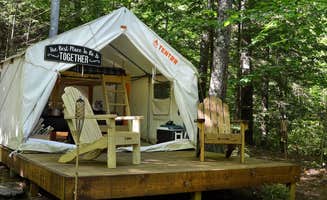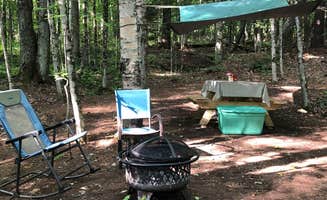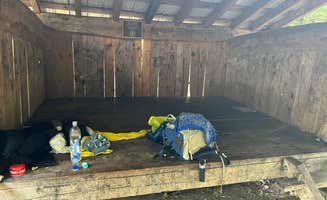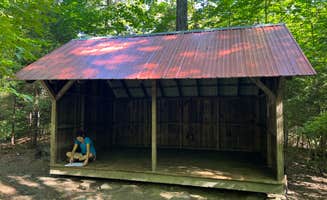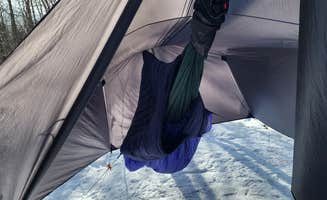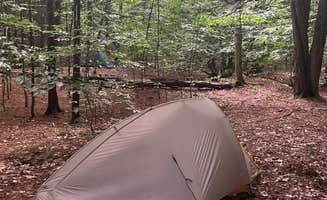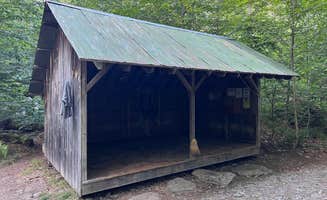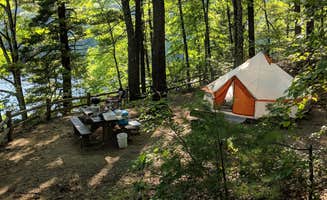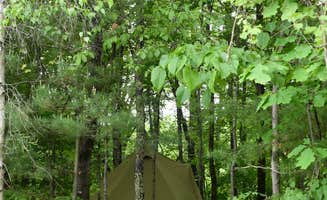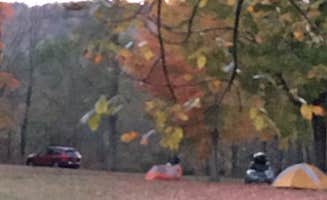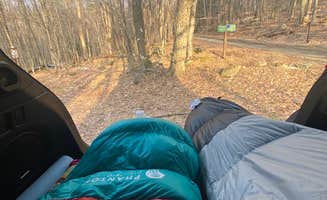Tent campsites near Acworth, New Hampshire offer diverse backcountry experiences beyond established campgrounds. Most primitive sites in this region sit between 800-1500 feet elevation, providing cooler summer temperatures than coastal New Hampshire areas. Seasonal water restrictions often impact backcountry sites from July through September, requiring campers to carry extra water during dry periods.
What to do
Paddling opportunities: At Tully Lake Recreation Area, visitors can explore the lake's many islands. "We take our canoe and spend the whole day at the lake. You can find lots of private areas to swim, pick blueberries and relax," notes camper Ben P.
Hiking trails: Primitive camping at Velvet Rocks Shelter provides access to the Appalachian Trail system. The shelter serves as a waypoint during section hikes, with one camper noting: "This was a decent shelter to stop at along the AT, but I would not consider it a weekend destination."
Swimming options: The region features several swimming locations beyond designated beaches. Little Rock Pond offers surprisingly comfortable water temperatures despite its elevation. As one visitor explains, "The pond is surprisingly warm for its altitude and it's home to two Common Loons."
What campers like
Privacy between sites: At Lost Boys Hideout, the camping areas feature natural separation. Recent improvements have enhanced the experience, with visitor Steve K. noting: "Nice new tents provided at Sleepy Hollow site. Improvements to the firepit, area all mulched, even some games and water are provided!"
Cart-based transport system: The walk-in nature of several area campgrounds creates a quieter experience. At Tully Lake, "No cars at all at the campsites, which was great for peace of mind as our toddler roamed around. It also made for a super quiet stay," according to camper Megan G.
Shelter accommodations: For those seeking more structure than tent sites, Stratton Pond Shelter provides multiple overnight options. "There are 2 tent platforms, 2 outhouses and at least 16 bunk spaces in the shelter," reports Miccal M. after a winter stay.
What you should know
Seasonal water availability: Backcountry water sources become unreliable during summer months. At Velvet Rocks, one hiker found "the water source here was dry during my trip which was expected during the drought (August 2022)."
Site access logistics: Many sites require hiking or using provided transport. At Maple Ridge Farm, "They'll drive you in an ATV up to some of the sites that are further away from the parking lot," according to Les R.
Varied tent pad conditions: The quality of tent sites differs significantly across locations. At Tully Lake, certain sites offer more level ground than others, with one camper observing: "We stayed at site 1, which was HUGE and extremely private. Sites closer to the water that we saw were less private, but still very peaceful and spread out."
Tips for camping with families
Site selection strategy: Choose locations based on bathroom proximity for younger children. One Tully Lake visitor cautioned: "Our site was fairly far from services, long run with small kids in the middle of the night. Not our favorite place, but to be fair mostly based on our site and neighboring campers."
Campground programs: Some locations offer scheduled activities. Cardigan Campsites provides a convenient base for family-friendly hikes, with Madison G. noting it's a "Great spot to spend the night before a climb of Mt. Cardigan! Or after! The climb is challenging but shouldn't take too long."
Weekend planning: Holiday periods bring increased noise at certain campgrounds. At Tully Lake, one camper shared: "We went memorial day weekend few years ago, busy holiday of young teens partying. Park staff tried their best, but other campers definitely took away from our stay."
Tips from RVers
Limited hookup options: Most tent camping areas near Acworth lack RV services. Primitive sites along the Appalachian Trail, like Winturri Backcountry Shelter, technically permit RVs but lack practical access, with one visitor noting: "This is a back country shelter on the Appalachian trail that doesn't have consistent water."
Gear transport considerations: The carry-in nature of sites presents challenges for equipment-heavy campers. At Tully Lake, one experienced visitor advises: "Keeping gear to a minimum is a good idea" because "though they provide carts the trails can make hauling them tough."


